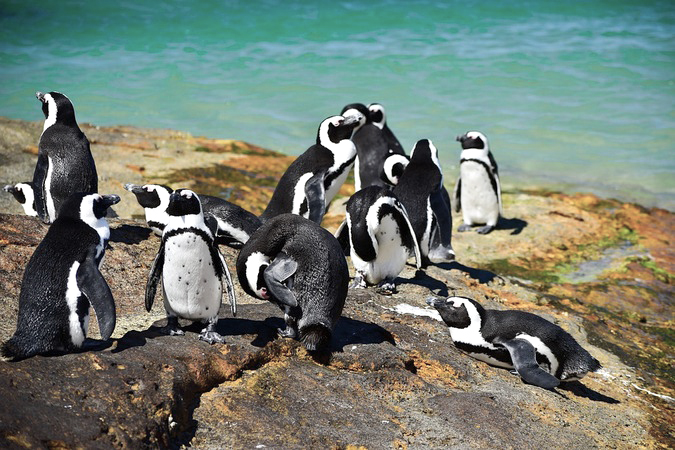
Press release by SANCCOB (Southern African Foundation for the Conservation of Coastal Birds)
Cape Town is synonymous with many things, like Table Mountain, picturesque landscapes, beautiful beaches, and of course our iconic African penguin. The Simon’s Town penguin colony, on the False Bay coastline, is jointly managed by the City of Cape Town (CCT) and Table Mountain National Park (TMNP).
The Seaforth Beach to the Water’s Edge Beach section, and the Burghers Walk through to the Franks Bay are controlled by the CCT, while the Boulders section is managed by South African National Parks (SANParks). Take a look at the map below showing the penguin management area in Simon’s Town.
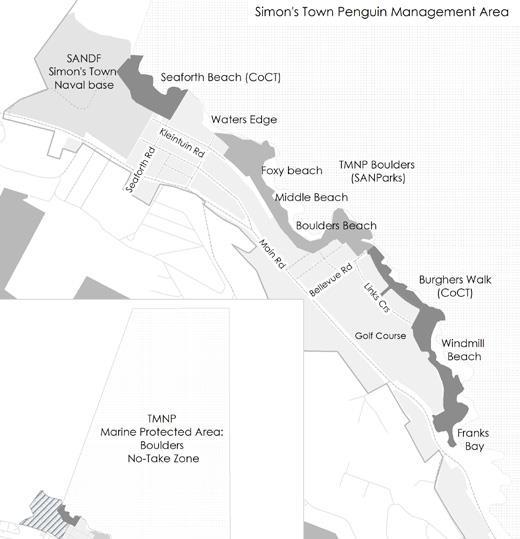
The CCT works in partnership with the Cape Town Environmental Education Trust (CTEET) and the Southern African Foundation for the Conservation of Coastal Birds (SANCCOB) who funds the penguin monitor programme and assists with the research and monitoring of the penguin colony.
Currently, there is an area supervisor, four penguin monitors, a CTEET learnership student and four Wildlife and Environmental Society of South Africa (WESSA) beach stewards working with the project.
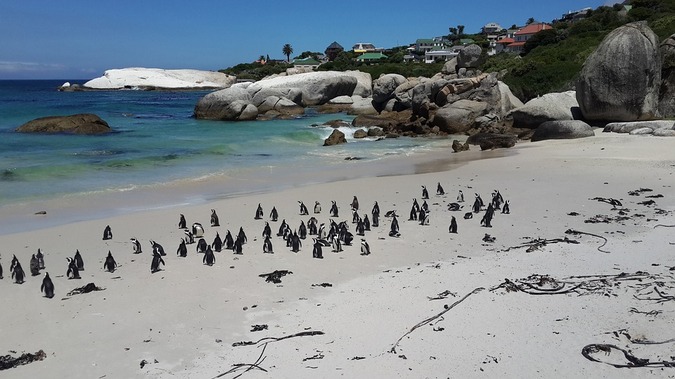
WESSA beach stewards and the Tourism Blue Flag programme
The Tourism Blue Flag programme is a three-year coastal tourism and youth development project implemented by WESSA in partnership with the National Department of Tourism. This project aims to improve the experience of both domestic and international visitors to our beaches, while simultaneously providing youth with accredited training to help them find employment in the coastal tourism sector. The beach stewards are hosted by local coastal municipalities and are involved in activities such as the monitoring of all beach activities; conducting visitor surveys, as well as collecting other data.
They also provide updates on weather and general beach conditions via Twitter; coordinate fun and interactive environmental education activities for schools; assists lifeguards by improving water safety at the beach; and help beach managers to maintain high blue flag standards relating to safety, environmental management, water quality, and environmental education at their beaches.
The beach stewards are also receiving accredited training in environmental education from WESSA.
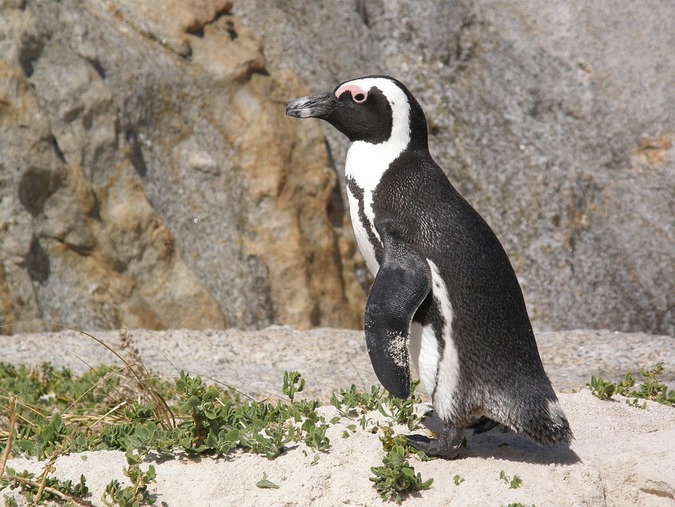
Monitoring the Simon’s Town penguin colony
Our penguin monitors work seven days a week, 365 days a year to ensure that our seabirds are protected and co-exist peacefully with residents and visitors in the Simon’s Town coastal area.
Seaforth beach dune rehabilitation
This year, coastal management has been focusing on stabilising the dunes on the western side of Seaforth Beach. The area has suffered under the trampling of visitors to see the penguins down at the beach. The increased scouring from wind erosion was having a negative impact on the surrounding areas being inundated with windblown sand. The team has erected wind nets and barriers to protect the vegetation and allow it to recover naturally. The barriers also reduce disturbance to the breeding and moulting penguins in the area.
Residential sweeps
Our penguin monitors conduct residential sweeps three times a week. During these rounds, they remove penguins breeding outside designated breeding areas, especially those in unsafe areas. These may include areas where they have to cross roads on their way to the sea, could be attacked by dogs, and where they are unwelcome on private properties. Any penguin chicks or eggs found during these sweeps are taken to SANCCOB for incubation and hand-rearing.
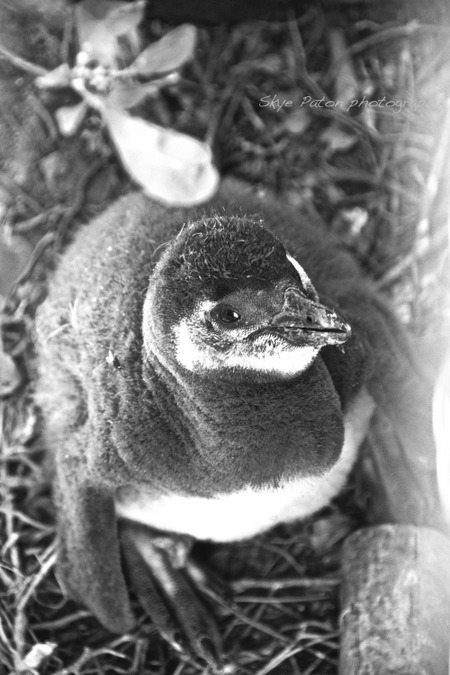
Penguin Monitoring with microchips
African penguins used to be marked with flipper bands, but nowadays, small microchips (similar to a cat or dog’s microchip) are being used and birds can be identified using hand-held or ground readers. This greatly reduces stress on the birds and provides a wealth of important data that is easily collected. The penguins are being individually marked with microchips, both at the breeding colonies and when released from rehabilitation centres.
A ground reader installed in 2018 at Boulders records any marked penguin coming into the colony. Among the birds being resighted are breeding adults from Simon’s Town, young birds that might start breeding at Boulders, and some from other colonies such as Robben Island and Stony Point.
Many of the young birds visiting Boulders were hand-reared at SANCCOB after being abandoned by their parents. The information that we receive from the ground reader is crucial to understanding the survival and movement of young penguins and how they decide where to breed. This will help in the conservation of the species.
Moulting and chick abandonment
African penguins usually breed and moult only once a year. During the moult, they replace all their feathers to retain their waterproofing properties. However, during this period they are land-bound and can’t go into the sea to feed. Fortunately, moulting starts a few weeks after the chicks have successfully fledged, giving the parents time to fatten up. In some years, birds lose their first clutch of eggs or chicks, either because of bad weather conditions or due to a shortage of food (small pelagic fish). Birds may then attempt to breed again later in the year.
However, if this coincides with the moulting period, adults abandon their chicks as they can’t feed them. In these cases, the chicks will be pro-actively rescued and admitted to SANCCOB for hand-rearing and released once they are old enough.
The African penguin (Spheniscus demersus) is listed as ‘Endangered’ on the IUCN Red List of Threatened Species. The current conservation status of the African penguin is such that we can’t afford to lose these late season chicks to natural mortality events.
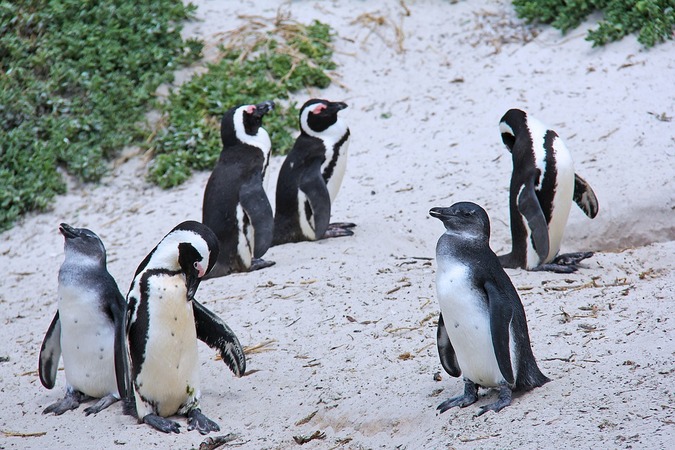
Threats to penguins
Pollution
Luckily, no major oil spill or pollution event occurred in, at or near the colony in 2018. Nevertheless, penguins and other birds still get oiled (from unlikely sources) and need to be admitted to SANCCOB for cleaning and rehabilitation.
Avian influenza
In early 2018, avian influenza (bird flu) was detected in seabirds in South Africa. The same virus had affected ostrich and poultry farms in the previous year. The virus killed large numbers of swift terns and affected several other seabird species, like the African penguin.
Fortunately, very few African penguins died of the virus, among these were four birds from Simon’s Town. As a precautionary measure, all colony-based research was stopped to reduce the risk of transmitting the virus between birds and colonies. No new cases have been observed for several months now and colony work has resumed.
The virus is not dangerous to humans but if you find dead seabirds, or seabirds showing signs like drowsiness, unable to fly (except for penguins) or possibly blindness (milky eyes), please contact our Penguin Monitors.
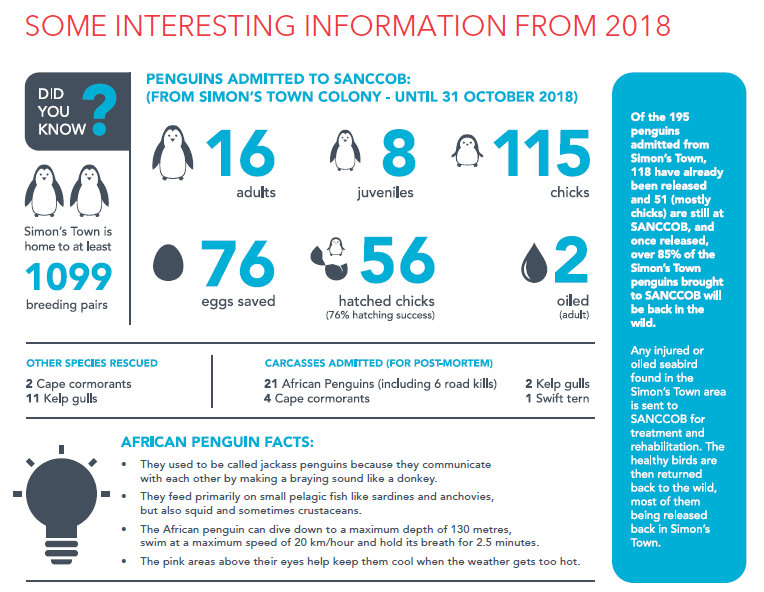
How you can help the penguins
The penguin monitor project is funded through donations received by SANCCOB and covers the costs of the penguin monitor salaries and a vehicle for transporting penguins to SANCCOB. Please help us sustain this project as it also serves as an important development opportunity for budding conservationists.
If you would like to contribute please contact SANCCOB directy: www.sanccob.co.za
Contact numbers
• SANCCOB (Southern African Foundation for the Conservation of Coastal Birds): +27-021-557-6155 ; info@sanccob.co.za ; www.sanccob.co.za
• Report injured or oiled birds in Simon’s Town to the penguin monitors: Cell +27-076-624-7454 or Office +27-021-400-1725 (07h30 – 16h00)
• Table Mountain National Park, Boulders Office: +27-021-786-5787
• For general penguin management and coastal enquiries, please contact Arne Purves: arne.purves@capetown.gov.za
• Please report general law enforcement and marine related offences to the City on +27-021-480-7700
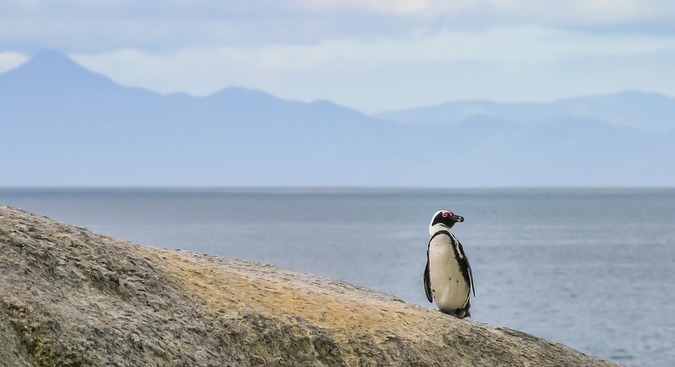
To comment on this story: Login (or sign up) to our app here - it's a troll-free safe place 🙂.![]()






